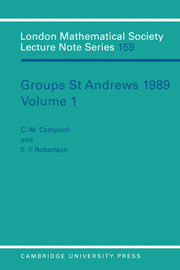Book contents
- Frontmatter
- Contents
- CONTENTS OF VOLUME II
- Preface
- Introduction
- 1 Triply factorized groups
- 2 An introduction to a class of two relator groups
- 3 An infinite family of nonabelian simple table algebras not induced by finite nonabelian simple groups
- 4 Horace Y Mochizuki: In Memoriam
- 5 Bounds on character degrees and class numbers of finite non-abelian simple groups
- 6 Finite presentability and Heisenberg representations
- 7 On nilpotent groups acting on Klein surfaces
- 8 Some algorithms for polycyclic groups
- 9 On the regularity conditions for coloured graphs
- 10 Multiplet classification of highest weight modules over quantum universal enveloping algebras: the Uq(SL(3,C)) example
- 11 Solutions of certain sets of equations over groups
- 12 Generalizing algebraic properties of Fuchsian groups
- 13 A theorem on free products of special abelian groups
- 14 Schur algebras and general linear groups
- 15 On Coxeter's groupsp,q,r
- 16 Integral dimension subgroups
13 - A theorem on free products of special abelian groups
Published online by Cambridge University Press: 05 April 2013
- Frontmatter
- Contents
- CONTENTS OF VOLUME II
- Preface
- Introduction
- 1 Triply factorized groups
- 2 An introduction to a class of two relator groups
- 3 An infinite family of nonabelian simple table algebras not induced by finite nonabelian simple groups
- 4 Horace Y Mochizuki: In Memoriam
- 5 Bounds on character degrees and class numbers of finite non-abelian simple groups
- 6 Finite presentability and Heisenberg representations
- 7 On nilpotent groups acting on Klein surfaces
- 8 Some algorithms for polycyclic groups
- 9 On the regularity conditions for coloured graphs
- 10 Multiplet classification of highest weight modules over quantum universal enveloping algebras: the Uq(SL(3,C)) example
- 11 Solutions of certain sets of equations over groups
- 12 Generalizing algebraic properties of Fuchsian groups
- 13 A theorem on free products of special abelian groups
- 14 Schur algebras and general linear groups
- 15 On Coxeter's groupsp,q,r
- 16 Integral dimension subgroups
Summary
Introduction
In a previous paper [1], the quotient groups of the lower central series Ḡn = Gn/Gn+1 were studied. There the group G was assumed to be a free product of a finite number of finitely generated Abelian groups and Gn denoted the nth subgroup of the lower central series of G. Here we give an improved proof of a complicated lemma which first appeared in [1] (in particular, Lemma 4.4 of [1]). The proof given here, especially for property (iii) of the conclusion of that lemma, is a significant simplification of that which appears in [1]. We observe that one of the consequences of Lemma 4.4 of [1] is to give a set of free generators for the lower central quotients in the case where the free factors are torsion free (i.e., G = J in the terminology of [1]. Moreover the free generators are the J-basic commutators also using the terminology of Definition 4.1 of [1]). The authors only thought of this simplification after the publication of [1]. Furthermore, our improved proof uses results from [2] and [3].
In this paper, we will employ the notation, terminology, results, references, and equations of [1]. Furthermore, the numbering, a.b, of any definition, equation, etc., of [1] will correspond here to a.b-I. For example, Lemma 2.1-I will mean Lemma 2.1 of [1].
Preliminaries
In order to carry out our goal, we need to give some preliminary machinery.
- Type
- Chapter
- Information
- Groups St Andrews 1989 , pp. 148 - 154Publisher: Cambridge University PressPrint publication year: 1991



